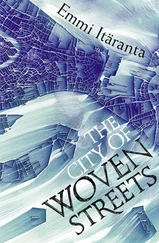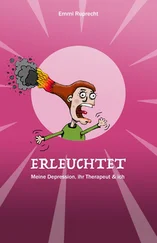We continued along a circuitous route.
We crossed a shallow, muddy brook that trickled through the landscape near the plastic grave. As children we had not been allowed here. My mother had said that the ground around it was toxic and the grave dangerous to walk on, a foot could slip at any time and something sharp tear the clothes and the skin. Back then we used to plan our secret excursions to the plastic grave carefully, usually coming between day and night, when it wasn’t dark enough for us to need blaze lanterns yet and not light enough for us to be recognisable from a long way away.
The plastic grave was a large, craggy, pulpy landscape where sharp corners and coarse surfaces, straight edges and jagged splinters rose steep and unpredictable. Its strange, angular valleys of waves and mountain lines kept shifting their shape. People moved piles of rubbish from one place to the next, stomped the plains even more tightly packed, dug big holes and elevated hills next to them in search of serviceable plastic and wood that wasn’t too bent out of shape under layers of garbage. The familiar smell and sight of the grave still brought me back the memory of the long boots I had always worn in the fear of scratching my legs, the coarseness of their fabric, how hot and slippery my feet had felt inside them.
Now I was only wearing a pair of wooden-soled summer shoes that didn’t even cover my ankles, but I was older and the day was bright. Dead plastic crunched under the weight of our steps and horseflies and other insects were whirring loudly around our hooded heads. I had rolled my sleeves down and tied them tight at the wrists, knowing that any stretch of bare skin would attract more insects. My ankles would be red and swollen by the evening.
I kept an eye on anything worth scavenging, but passed only uninteresting items: crumbled, dirty-white plastic sheets, uncomfortable-looking shoes with broken tall heels, a faded doll’s head. I stopped and turned to look behind me, but Sanja wasn’t there anymore. I saw her a few metres away, where she had crouched to dig something out of a junk pile. I went closer when she pulled what looked like a lidded box out from a mishmash of split bowls and twisted hangers and long black splinters.
The box was the shape of a rectangle; I had never seen one like it before. The scratched, black surface looked like it had been smooth and shiny once. At each end of the rectangle there was a round dent covered by a tight metal net.
‘Loudspeakers,’ Sanja said. ‘I’ve seen similar ones on other past-tech things. This was used for listening to something.’
Between the loudspeakers there was a rectangular dent, slightly wider than my hand. It had a broken lid that could be opened from the upper corner. On top of the machine there were some switches, a row of buttons with small arrows pointing at different directions embossed on them, and one larger button. When it was turned, a red pointer moved along a scale marked with numerical combinations that meant nothing: 92, 98, 104 and so on. At the right end of the scale the letters ‘Mhz’ could be seen. In the middle of the top panel there was a round indentation, slightly larger than the one in the front panel and covered by a partially transparent lid.
I knew without asking that Sanja was going to take the machine home with her. Her face revealed that she was already picturing the inside hidden by the cover in her mind and seeing herself opening the machine, memorising the order of the different parts, conducting electricity from a solar generator into it in order to see what happened.
We wandered on the plastic grave for a while longer, but we only found the usual rubbish – broken toys, unrecognisable shards, useless dishes and the endless mouldy shreds of plastic bags. When we turned to return to the village, I said to Sanja:
‘I wish I could dig all the way to the bottom. Perhaps then I’d understand the past-world, and the people who threw all this away.’
‘You spend too much time thinking about them,’ Sanja said.
‘You think about them too,’ I told her. ‘You wouldn’t come here otherwise.’
‘It’s not them I think about,’ Sanja said. ‘Only their machines, what they knew and what they left to us.’ She stopped and placed her hand on my arm. I could feel the warm outline of her fingers through the fabric of my sleeve and the burn of the sun around it, two different kinds of heat next to each other. ‘It’s not worth thinking about them, Noria. They didn’t think about us, either.’
I have tried not to think about them, but their past-world bleeds into our present-world, into its sky, into its dust. Did the present-world, the world that is, ever bleed into theirs, the world that was? I imagine one of them standing by the river that is now a dry scar in our landscape, a woman who is not young or old, or perhaps a man, it doesn’t matter. Her hair is pale brown and she is looking into the water that rushes by, muddy perhaps, perhaps clear, and something that has not yet been is bleeding into her thoughts.
I would like to think she turns around and goes home and does one thing differently that day because of what she has imagined, and again the day after, and the day after that.
Yet I see another her, who turns away and doesn’t do anything differently, and I can’t tell which one of them is real and which one is a reflection in clear, still water, almost sharp enough to be mistaken for real.
I look at the sky and I look at the light and I look at the shape of the earth, all the same as theirs, and yet not, and the bleeding never stops.
We spoke little on our way back to Sanja’s house.
She stood in the shadow of the veranda when I fastened the repaired waterskin to the cart and stepped on the pedal of my helicycle. The day around us blazed tall and bright, and she was small and narrow and grey-blue in the dark shadow.
‘Noria,’ she said. ‘About the charge.’
‘I’ll bring you the first two skinfuls later today,’ I said. When I started towards the tea master’s house, I saw her smile. It was thin and colourless, but a smile nevertheless.
My father would not be pleased.
Late in the following afternoon I climbed the path from the teahouse towards the gate. I stopped on the way by the rock garden to pick some mint. The pale sand rippled around dark-grey boulders like water surrounding abandoned islands. The three tea plants growing just outside the edge of the sand burst towards the clear sky like green flames. I put the mint leaves in my mouth and continued to the small hillock in the shadow of a pine tree by the gate, from where I could see the road through the shadows of the scattered trees. The most burning heat of the day had already passed and the ceremony outfit felt cool and pleasant against my skin. Yet the hard-soled sandals were uncomfortable under my tired feet, and my arms ached.
My father had risen after a few short hours of sleep in the pale-gold light of a white night turning to morning. He didn’t always wake me this early on ceremony days, but this time he knew no mercy. I knew it to be my unspoken punishment for having stayed too late at Sanja’s house on the day before. He gave me one task after another, sometimes three at once, and by the time my mother got up for breakfast, I had already raked the rock garden, carried several skinfuls of water into the teahouse, swept the floor twice, hung decorated blaze lanterns inside and outside, aired the ceremony clothing, washed and dried the teacups and pots, placed them on a wooden tray, wiped dust from the stone basin in the garden and moved the bench on the veranda three times before my father was happy with its exact position.
It was with relief, then, that I walked to the gate to wait for our guests, when he finally released me from my preparation duties. I had eaten hardly anything since breakfast, and I chewed on the mint leaves to chase my hunger away. In the weary sunlight of the afternoon I had trouble keeping my eyes open. The faint tinkling of wind chimes in the garden flickered in my ears. The road was deserted and the sky was deep above, and all around me I sensed small shifts in the fabric of the world, the very movement of life as it waxed and waned.
Читать дальше
Конец ознакомительного отрывка
Купить книгу












